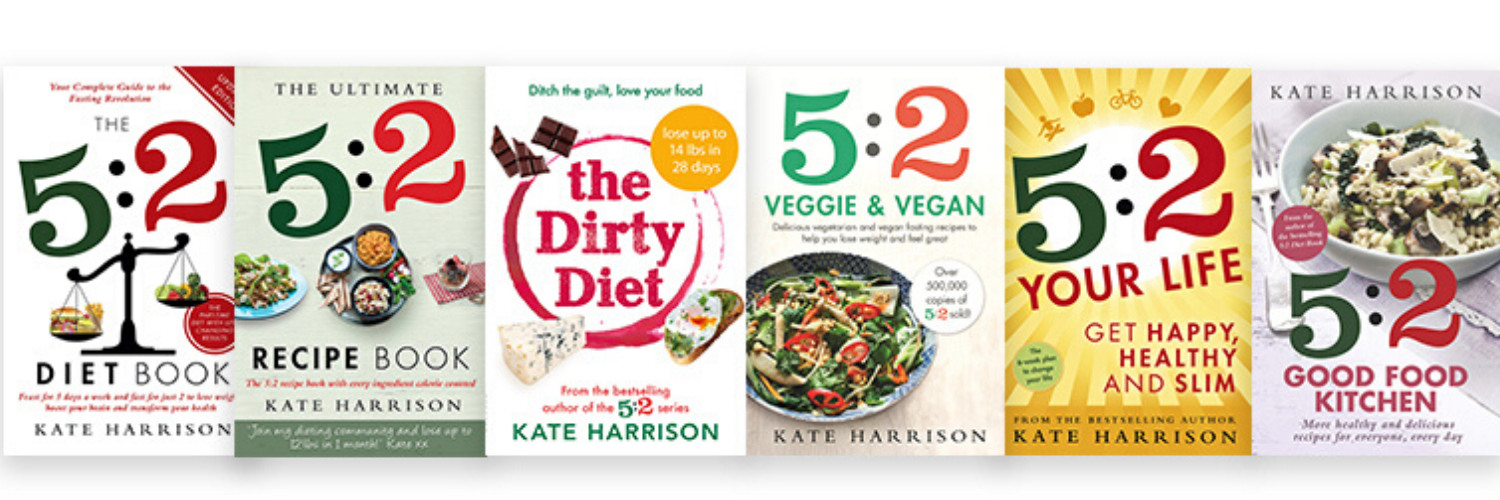Podcast Episode 5 is all about the other five days in 5:2: how to enjoy your food when you’re not fasting, including treats, without undoing the hard work of a fasting day...
Can you eat normally when you’re not fasting on 5:2 – and should you calorie count, or try to keep to a limit? In this episode, Kate talks about how to adjust your eating to a healthy, balanced diet where treats are allowed and nothing is banned. She demystifies BMR, TDEE and WOE – and reads out her diary entry from her first post-fasting Friday… and reflects on what she’s learned since 2012. Listen/download above- or subscribe on iTunes
Podcast 5 Notes
In this episode, I'm talking about eating normally and what that means. One of the things I’ve discovered since starting this lifestyle is that I did eat much more than I realised or needed. One way to get an idea of what our requirements may be in calories is using a simple calculation, as seen on the calculator page.
It'll help you work out your BMR: which is the minimal calories your body needs to tick over - keep the basic functions going - without losing or gaining weight. This then helps you calculate your...TDEE which is more relevant as it factors in how active you are, and helps you see how many calories you'd need each day to maintain your current weight (remember it's the Fast Days which help you create the calorie deficit/gap you need to lose weight).
Knowing this figure can be helpful - I have mine in the back of my mind, but am not a slave to it at all: you can calculate this easily via our Calculator!
The important thing to remember is that you don't have to calorie count on normal days unless you want to: we want to reach a point where we listen to our body and know when we're full up. Some days we will naturally want to eat less than our TDEE, other days more. For me, the view of what a ‘portion’ of food was, had become skewed and that’s one of the reasons many of us have suffered weight problems. So, although you can eat all the things you love on your normal days, there’s clearly a sensible balance.
This diet will probably re-educate you by stealth. You’ll become fuller sooner, and you’ll enjoy your favourite foods but perhaps not in the same quantities. It won’t happen overnight but most of us who’re doing this long-term have noticed the effect. It’s almost like a reset button on an electronic appliance that’s gone haywire – fasting has made me work properly again, still enjoying food, but eating what I need and no more.
The work done by Krista Varady at the University of Illinois compared alternate day fasters who ate a low-fat diet on their non-fasting day, with those who ate a ‘normal’ high-fat diet when they weren’t fasting. Surprisingly – and happily – the reduction in weight and cholesterol was as good, if not better, in those participants who were encouraged to eat all their favourite dishes, including the occasional pizza and or burger.‘Rebound’ eating or over-compensation simply didn’t happen on the non-fasting days. Obviously with 5:2 you have fewer 'fast days' than with the Illinois research, but many of our forum and group members have seem similar results: little or no over-eating to compensate, a greater awareness of appetite and fullness, and a more balanced approach to food.
WOE/WOL: simply means Way of Eating or Way of Life - an alternative way to talk about the intermittent fasting approach if the word 'diet' makes you feel unsettled.
Some non-fast day tips:
Focus on positive goals e.g. eating five or seven portions of vegetables, or a rainbow of natural produce.
Be calorie-aware NOT calorie obsessed. Eat treats if you really fancy them, but do it mindfully and slowly, really savouring the tastes.
There's no need to ban carbohydrates like white bread or pasta, but if you find they make you crave more, try shifting the balance so you have more sauce, less pasta, or fewer potatoes and more green vegetables/protein.
Important Note:This podcast is for information only and is not intended as medical advice, or as a substitute for medical advice, diagnosis or treatment. There are some people who shouldn’t follow this diet: children and teenagers, and pregnant or breast-feeding women. If you take medication have a pre-existing medical condition, including Type 2 diabetes, you should talk to your doctor before making any dietary changes. In addition, anyone with a history of eating disorders should definitely not undertake this without talking to their doctor or specialist.


